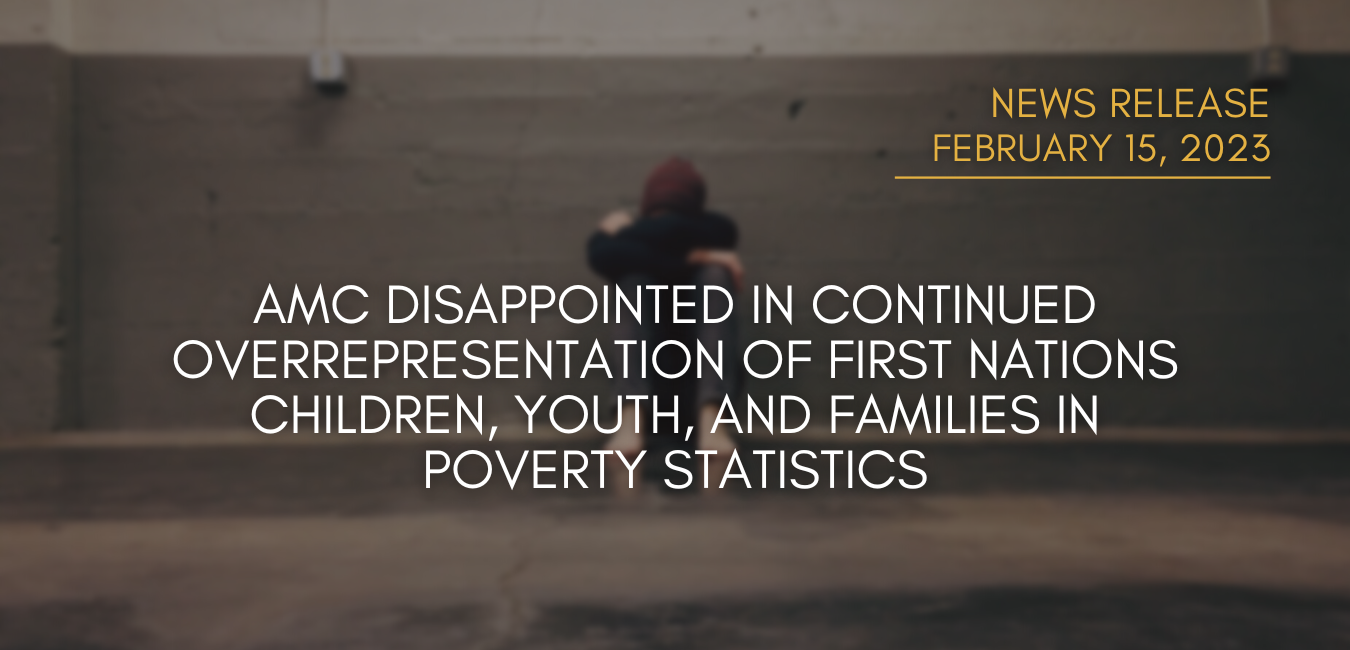AMC Disappointed in Continued Overrepresentation of First Nations Children, Youth, and Families in Poverty Statistics

February 15, 2023
Treaty One Territory, Manitoba
AMC Communications
Treaty One Territory, Manitoba – the Assembly of Manitoba Chiefs (AMC) issues this statement in response to the Campaign 2000 Report released on February 14, 2023, entitled, Poverty, the Pandemic and the Province indicating that Manitoba has the highest rate of child poverty amongst the provinces, wherein First Nations children, youth and families remain starkly overrepresented following a trend from past reports.
The Campaign 2000 Report shows that 41.6% of First Nations children live in poverty, the highest rate in comparison to other children which reflect the enduring consequences of “colonialism, marginalization, and discrimination” (p.17, 2023). The Report further outlines that if the Province of Manitoba targeted their Affordability package to low-income households as opposed to those who were able to financially withstand the effects of the pandemic, we might have witnessed a significant reduction in poverty for First Nations children. This ongoing inequality was identified by the Manitoba Centre for Health Policy (MCHP) in their 2019 Report The Health Status of and Access to Healthcare by Registered First Nation Peoples in Manitoba, stated that the poverty line in 2015 was $33,000-$41,000 where 54% of First Nations households had a total income of under $30,000, living well below the poverty line (p.166, 2019).
“Evidently, not much has changed” states Grand Chief Cathy Merrick. “In the context of colonialism, the constant oppression First Nations have been subjected to across time through detrimental government policies has had a profoundly devastating impact on our children and families. We continue to endure overrepresentation amongst poverty statistics despite the recognition of the systemic nature of these circumstances and institutional oppression which creates these poor outcomes. The government in this province does little to take accountability nor do they make adequate efforts to challenge the normalization of our suffering and the constant stereotypes our citizens are subjected to as a result of this discriminatory treatment” continued Grand Chief Cathy Merrick.
In 2020, the First Nations Health and Social Secretariat of Manitoba (FNHSSM) contributed to another MCHP Report entitled Our Children, Our Future: The Health and Well-being of First Nations Children in Manitoba (2020) which highlighted that poverty for First Nations children was extraordinarily high at 76 percent and that First Nations children are subjected to the most significant risk of experiencing poverty and the resulting poor physical and mental health outcomes in contrast to their non-First Nations counterparts. The report further identified colonization and its impacts creating living conditions that are ultimately unsustainable in First Nations, thereby compounding their likelihood of living in poverty (Manitoba Centre for Health Policy, 2020).
“This is the cost of exclusion, and the continued refusal to engage with First Nations leadership on policy and legislative development that has historically led to devastating impacts on our families” states Grand Chief Merrick. “In our efforts to contribute to reports to highlight the manner in which discriminatory government policy is often a key indicator of First Nations poverty rates, we are still doing the same thing – it is extremely disappointing”.
Furthermore, a 2020 report released by the Government of Canada, Building Understanding, The First Report of the National Advisory Council on Poverty, acknowledged that First Nations people in Canada are at an increased risk of living in poverty due in part to a “long history of racism…as a result of colonialism and government programs and policies over more than a century” that are connected to the dispossession of First Nations people from their traditional territories, cultures and languages facilitated through the Indian Residential School (IRS) system. Additional data from their 2018 findings also suggests that there are significant differences in the poverty rate for First Nations living off reserve at 24.4% compared to Metis at 14.2% and Inuit at 15.8%. Canada further acknowledged that there are significant data gaps for tracking poverty and income estimates for First Nations citizens living on reserve, but current data suggests that living conditions on reserve have much lower outcomes for education, employment, and income in contrast to those living off reserve and for all of these reasons, addressing this level of systemic poverty for First Nations people requires different policy responses and tools.
The AMC calls upon the Province of Manitoba and Government of Canada to support First Nations leadership to develop a strategic poverty reduction plan for First Nations children, youth and families who remain overrepresented across years of reporting. It is time to target policies in a manner that reconciles the ongoing discrimination that keeps our families in poverty.
-30-
For more information, please contact:
Communications Team
Assembly of Manitoba Chiefs
Email: media@manitobachiefs.com
About the Assembly of Manitoba Chiefs
The AMC was formed in 1988 by the Chiefs in Manitoba to advocate on issues that commonly affect First Nations in Manitoba. AMC is an authorized representative of 62 of the 63 First Nations in Manitoba with a total of more than 151,000 First Nation citizens in the province, accounting for approximately 12 percent of the provincial population. AMC represents a diversity of Anishinaabe (Ojibway), Nehetho / Ininew (Cree), Anishininew (Ojibwe-Cree), Denesuline (Dene) and Dakota Oyate (Dakota) people.